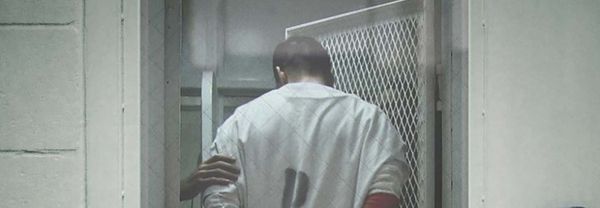Eye For Film >> Movies >> Into The Abyss: A Tale Of Death, A Tale Of Life (2011) Film Review
Into The Abyss: A Tale Of Death, A Tale Of Life
Reviewed by: Owen Van Spall

Late 2011 sees Herzog remaining in documentary mode, following on from the UK release of his Cave Of Forgotten Dreams with his London Film Festival screening of Into the Abyss. Herzog is an old hand at this crafting this kind of factual film and unearthing the unusual material to form the bones of the piece, and the result is an intriguing if uneven journey into a strange, violent and very sad part of modern America.
Into The Abyss focuses on the fallout from a brutal triple homicide case in rural Conroe, Texas more than 10 years ago. It was a crime of staggering violence and stupidity, which saw a gang of youths rob and murder a Texas mother, her son and his best friend, simply so they could steal a rare Camero sports car from the garage of the family home. Following a shootout, the two main protagonists, Michael Perry and Jason Burkett, were swiftly captured. Burkett was given life imprisonment. Perry, a bizarre, violent and tragic figure, was given the death penalty.

Outside of the raw footage taken from the initial crime scene records - including a haunting sweep of the dining room and kitchen in the house where the TV blares unattended in the background and uncooked cookie dough rests on trays in the oven - Herzog's material comes from the last 10 or so days before 28-year-old Perry's execution. It features interviews with the two convicts and the victims' family members, law enforcement officers and extended interviews with Burkett's father.
Though a documentary about the system of capital punishment might seem like nothing fresh (Nick Broomfield has mined this territory well with his work on Aileen Wuornos, for example), Herzog is able to keep his film distinctive through his uncanny ability to unearth insights into the odd, the tragic and the farcical. This isn't really a film about the process of the capital punishment system, as such, or a polemic against the convictions, more an exploration into how death pervades America, both behind and outside the bars.
Conroe seems a town infused with death, sadness, hopelessness and blighted lives, with both the wider Texas state and its citizens engaged constantly in the act of killing. Perry and Burkett come across as particularly pathetic, deluded and ill-fated individuals rather than cold-blooded killers. Seemingly all of Burkett's family were or are felons, while the babyfaced Perry was first befriended by Burkett whilst he was eking out a living out a car boot.
The victim's daughter reveals in one interview that before her mother was murdered virtually her entire surrounding family (including the dog) had already died tragically - she then rattles of a list of the deaths that seems never ending, including suicides, collisions with trains and homicides. It is such an strange and appalling litany of bad luck that is almost hilarious. In fact, Herzog can't seem to help bringing up a funny moment or two, such is the level of tragedy and stupidity to be found in Texas today, laughter seems the only response.
Herzog's camera also takes in a former state executioner who reckons he strapped over 120 convicts to the gurney for the final injection, and a pastor who spends the last hour with death row prisoners and admits to his conflicted feelings. Despite a few typically Herzogian oddball questions (including a squirrel-oriented query directed to the pastor) the director coaxes some of the most striking stories and body language from these individuals, particularly the executionist's story of how he suddenly became unable to continue in post after presiding over the killing of a woman for the first time.
It is therefore a shame that the film feels a little too short, and too many of the interviewees are not really challenged by Herzog in a direct fashion that might have added some layers to the film. Perry and Burkett, especially, don't seem to be questioned on the facts of their case or their own sense of responsibility - though, to be fair, Herzog has stated he was not interested in the issue of their innocence and did not wish to argue their case.
Still, it is hard by the end to feel we have dived as deep as we could have into any one facet of this particularly miserable case, though the director does shape a powerful atmosphere. You end up walking away with more of a sense of mood, time and place, as opposed to feeling you've been involved in a deep forensic or philosophical study.
Reviewed on: 24 Oct 2011
















